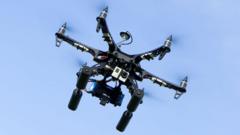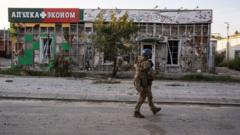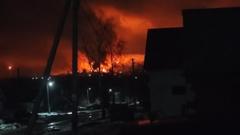Germany's cabinet has given the military the go-ahead to shoot down unauthorized drones near critical sites, as drone activity surges in the backdrop of rising geopolitical tensions, particularly following Russia's actions in Ukraine.
Germany Authorizes Army to Shoot Down Threatening Drones

Germany Authorizes Army to Shoot Down Threatening Drones
Germany's government takes action amid rising drone threats to military installations and infrastructure.
In a decisive move, Germany's cabinet has decided to empower its army to take lethal measures against suspicious drones seen hovering near military bases and other crucial infrastructure. Interior Minister Nancy Faeser expressed that this step is necessary due to the escalating use of drones, particularly in light of Russian President Vladimir Putin’s aggressive actions in Ukraine, which pose significant challenges to national security.
Minister Faeser pointed out that “drones are being used more frequently,” alluding to a broader security concern shared by Western governments, who suspect that Russia is quietly waging a "shadow war" against nations supporting Ukraine—an allegation that the Kremlin firmly denies. Polish Prime Minister Donald Tusk voiced similar concerns, stating that there are systemic attempts by Russia to disrupt global air travel, highlighting US intelligence warnings to allegedly thwart planned threats.
The backdrop to these announcements is marked by recent drone sightings over German military installations, including occurrences at the Manching Air Base and the US air base at Ramstein. The Interior Minister stated that various motivations, including espionage or sabotage, are being considered for these drone activities.
Under existing laws, the army’s involvement is limited to urging drones to depart or land, with the option to fire warning shots. However, the new regulations, pending parliamentary approval, would permit soldiers to eliminate drones perceived as immediate threats to people or critical infrastructure.
This latest measure reflects a heightened sense of alertness among Western nations concerning Russia’s potential aggressive maneuvers, including sabotaging logistics aimed at the United States and Canada. Poland has reported incidents of fires at courier companies as part of what officials believe to be preemptive trials for larger, more destructive operations previously attributed to Russian military intelligence.
As nations brace for ongoing threats and respond to this evolving landscape, the implications for air travel safety and military operations remain significant, indicative of the heightened vigilance and preemptive measures being undertaken.
Minister Faeser pointed out that “drones are being used more frequently,” alluding to a broader security concern shared by Western governments, who suspect that Russia is quietly waging a "shadow war" against nations supporting Ukraine—an allegation that the Kremlin firmly denies. Polish Prime Minister Donald Tusk voiced similar concerns, stating that there are systemic attempts by Russia to disrupt global air travel, highlighting US intelligence warnings to allegedly thwart planned threats.
The backdrop to these announcements is marked by recent drone sightings over German military installations, including occurrences at the Manching Air Base and the US air base at Ramstein. The Interior Minister stated that various motivations, including espionage or sabotage, are being considered for these drone activities.
Under existing laws, the army’s involvement is limited to urging drones to depart or land, with the option to fire warning shots. However, the new regulations, pending parliamentary approval, would permit soldiers to eliminate drones perceived as immediate threats to people or critical infrastructure.
This latest measure reflects a heightened sense of alertness among Western nations concerning Russia’s potential aggressive maneuvers, including sabotaging logistics aimed at the United States and Canada. Poland has reported incidents of fires at courier companies as part of what officials believe to be preemptive trials for larger, more destructive operations previously attributed to Russian military intelligence.
As nations brace for ongoing threats and respond to this evolving landscape, the implications for air travel safety and military operations remain significant, indicative of the heightened vigilance and preemptive measures being undertaken.





















